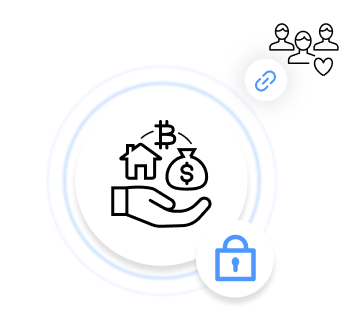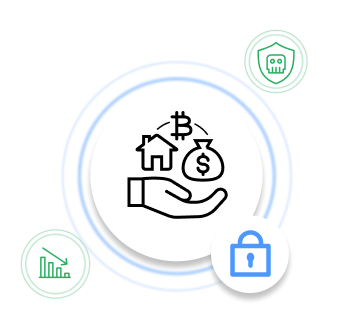
Estate planning
What is Estate Planning?
Estate planning also includes the consideration of a person’s legal, tax, and personal objectives, such as setting up a trust and the custody of young children.
But having an estate plan, which is especially important for wealthy people, is an ongoing process and, at the same time, quite an expensive one.
What is the difference between writing a will and estate planning?
The will determines what will happen to your assets, such as real estate, cash, savings, company stocks, bonds, shares, cryptocurrencies, and ETFs.
A will enables you to designate beneficiaries among your family and loved ones or donate some or all of your assets to charities or NGOs, but a last will and testament is part of the broader process of estate planning.
Estate planning, on the other hand, enables you to create a more comprehensive plan than just drawing up a will.
An estate plan includes many more legal tools, such as Guardianship, Establishment of a Trust, Financial Power of Attorney (FPOA), Durable Power of Attorney (DPOA), Advance Healthcare Directive (AHCD), and HIPAA Authorization.
Here it is important to note that much estate planning is done primarily with taxation in mind.
Let’s explore the main steps in estate planning.
What are the main steps in estate planning?
![]() Catalog your assets and debts
Catalog your assets and debts
In this preparatory step, you need to make a full inventory of all your assets and liabilities. Keep the summary of the inventory, together with the important original documents, in a secure place.
![]() Develop a contingency plan
Develop a contingency plan
Develop a documented plan that includes a strategy to control what would happen to your assets and real estate if you passed away.
![]() Protect your children
Protect your children
Detail your provision for your children under the age of 18 and those from previous marriages.
![]() Protect your assets
Protect your assets
If you aim to manage the tax consequences of your assets, a trust may be beneficial to you. As an asset protection tool, you can successfully use a last will and testament.
![]() Review your beneficiaries
Review your beneficiaries
Make sure that you have designated the right beneficiaries to your assets. People sometimes forget important details.
![]() Appoint your fiduciaries
Appoint your fiduciaries
Every perfect plan needs to be executed. Fiduciaries, such as trustees, executors, or guardians, have to be appointed, be notified, and agree to their appointment.
![]() Plan to reassess
Plan to reassess
Everything changes in our lives, including plans. Make sure that you regularly revise your estate plan, especially after important changes in your circumstances.
What are the four most important aspects of estate planning?
Estate planning is a prolonged and sometimes expensive process. But what happens if you don’t have one? Or if you have no official expression of your will regarding your assets after you pass away?
There will be consequences for your loved ones, ranging from minor inconveniences to enormous levels of stress, on top of the grief they will experience.
The four most important considerations in estate planning are these:
- Create an estate plan that removes the stress and worry from family members.
- Optimize it to reduce capital gains tax and inheritance taxes.
- Make sure that it protects your assets from the Probate Court.
- Plan in a way that will avoid or minimize disputes and contestation.
In summary, estate planning reduces the stress and burden on your loved ones. The better organized your estate planning is, the better protected your loved ones will be.
When should I start estate planning?
Some financial advisors say that you should initiate an estate plan as soon as you reach a legal age. While it is probably true that it is never too early to take the first step, you probably don’t need estate planning while you are in your early twenties.
As the main purpose of estate planning is to protect your assets and your loved ones, it makes sense to start thinking of an estate plan once you have acquired your first assets, not when you reach a legal age.
No matter when you start with your estate planning, it’s important to remember that it has to be regularly updated. Develop a habit of checking and updating your estate plan whenever major events happen in your life. Events that should trigger a revision of your estate plan are:
- A change in your marital status
- A new job
- New real estate
- A new member of the family
- A recent death in the family
- Newly acquired digital assets
DGLegacy and Estate Planning
How does DGLegacy help you to prepare your estate plan?
You are able to catalog your digital, financial, and non-financial assets, designate your preferred beneficiaries, and have them notified at the time you choose – while ensuring that your executor will know where to find your important documents.
With DGLegacy, you can protect all types of assets. Your secure document and password manager with digital inheritance also makes it easy for you to keep your list of assets and beneficiaries up to date.
This way, in the event of anything unforeseen happening to you, your loved ones:
![]() Are aware of your assets
Are aware of your assets
![]() Can identify and locate your assets
Can identify and locate your assets
![]() Can minimize the chance of unclaimed assets.
Can minimize the chance of unclaimed assets.
HOW IT WORKS
Protect your loved ones quickly and easily

Set up “alive” event
Crucial for the system's functioning, this step allows us to monitor that you are “alive”, we name it HeartBeat protocol. You have the option to adjust according to your preferences.
![]()

Catalog your assets
Catalogue the assets via DGLegacy, with minimum basic information needed, allowing your beneficiaries to identify and locate them.
![]()

Protect your assets
In case of a cyber security breach in a company which holds your assets, or media alerts for a risk related to its financial stability, DGLegacy will proactively notify you.
![]()

Invite beneficiaries and trustees
To add beneficiaries and trusties you need only their basic contact information - email and name. They will receive an invitational email.
![]()

Detection of fatal event
The Heartbeat protocol of DGLegacy, custom-engineered for your safety, confirms your well-being and detects any unexpected events. We proactively notify your beneficiaries about their designated assets in case of a tragic event.
TESTIMONIALS
Why DGLegacy® is the #1 place to secure your assets
![]()
![]()
CATALOGUE YOUR FIRST ASSET
Protect your loved ones when it matters the most
Join the people who trust DGLegacy® and start protecting your assets now.
 Victor
Victor Vlad
Vlad Ingrid Henke
Ingrid Henke Alara Vural
Alara Vural Agnieszka Michalik
Agnieszka Michalik Stella Schmitz
Stella Schmitz